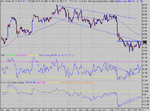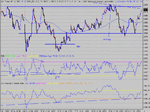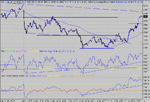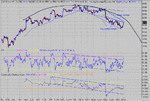Interesting reply you gave to Oarsman CM
Set me thinking about trading psychology. It's the section of the 'book on trading' one tends to skip through thinking, "yeah yeah, I'm OK with that sort of stuff, I can handle it, lets just get on with the technique".
A natural reaction I suppose and whilst the understanding of TA techniques is important the ability to implement them is equally important. I'm speaking from bitter recent experience.
One of the problems is that we mainly learn by our mistakes and successes. [Hope this is not too heavy] As children we learn that hot things burn so we don't do that anymore. We learn that good behaviour is rewarded, bad results in a less enjoyable existence. This I believe is something instilled in us from a very early age, action and result. We do this we get that, almost every time. Try teaching a dog to do tricks. Reward him with a bone he likes it and does it again.
If we apply the same principle to stock trading the outcome can be very different. Let me explain. We look for cause and effect and for a while the Dow index can provide that. I remember a last year about this time I discovered RSI and the particular setting I chose meant that, for a couple of weeks at least all I had to do was sell at RSI > 80 and buy < 20 and I would make profit.... very few exceptions. So I had found it the holy grail! Wonderful! Except that after that period the RSI very seldom reached 20 or 80. Oh dear. And very soon when it did reach these values the outcome became unpredictable.
Here's another. I think it was around spring 2002 when the FTSE was trading in the range 5000-5300. All I had to do was buy below 5100 and sell above 5200 and make profit. Worked very well and as more successes came along I increase my stake. Holy grail, here it is! Can't possibly go much below 5000 can it? No stop losses in place [for goodness sake don't lecture me]. Well history shows it can go where the hell it likes and did. Fortunately, and about the only thing I did get right, the stakes were pennies, even after increasing the stakes. I lost maybe £2k, well within my means. Just as an aside there was a comment from China White talking to someone in the chat room who had lost substantially more than that. He said that the experience is the best training you can get. If you read this China you have probably forgotten the line but it has stuck with me ever since, clinging to the hope that my 'learning' in that department is over!
Does any of this ring any bells with anyone? Or am I on my own?
Another approach, which I am sure has been tried many times. Bought UK stock history data from the year dot and wrote TA programs to back test each of the many TA techniques available. Back testing is a good idea but is no indication of how well the TA indicator will do in the future. If enough indicators are tested on a set of data then it is statistically likely that one or two will show a positive result on that particular data set. Change the data set and they will fail. Worse still is to take the few best TA tools from the test and alter their parameters until they produce even better results. That is self delusion! Fortunately I realised that before committing money to it.
As for stop losses, that is a hard lesson to learn. It is very easy in a range bound market to work without them, as long as there is sufficient margin. On a purely statistical basis the larger the stop loss the better the performance [might do a proof of that in the next few weeks, note 'statistical' i.e. completely random]. By not setting them and closing on a 3-6 month time frame mostly it is possible to get away with it. Again it comes back to our inbuilt learning instinct. If I don't set stop loss I make profit; never take a loss! No amount of good advice from this site and others seems to make a difference to the inexperience trader. Maybe, as China said, we can only learn by our own mistakes.
Now to my more recent attempts at CM's Dow strategy.
Again all the time I come up against pre conceived ideas about how the price ought to behave. For example when the price meets resistance what is it going to do? Well the last 5 times it went through so this time it must also be going through. Do you see the problem? It did it 5 times so it must happen a 6th. We learn all our lives through repetitiveness; it's instinct. Here's another, not recent I might add, at 8:40 the market always moves in one direction! Don't laugh. Self delusion. Maybe it does maybe it doesn't but mustn't trade as though it does. Has anyone else convinced themselves that the market moves in a particular direction at a particular time of day? You are destined to lose. The thing is if it does that for several days or weeks on the trot it is easy to convince yourself it always does that. At the moment we have a situation where the Dow makes most of its moves out of hours and we miss all the good moves. What are you gonna do about that? Modify the way you trade to accommodate it? Well its happened 5 or 6 times over the last few weeks so it must always be going to happen!
So maybe now you understand what I mean when I say I have trouble with the psychology of trading. How can I forget all I've learnt about cause and effect and just trade what I see using the indicators and Dow technique. At the moment this seems an insurmountable task. Pre conceived ideas get in the way. Does anyone else feel they are missing something if they are not in a trade by 3:30pm? If the price starts to move strongly in one direction do you feel the need to 'jump on the bandwagon' in case you miss the big move of the day, after all, the big moves are few and far between.
Apologies for this CM, but on the days when you say 'nice easy 100pts' and I've made a complete cock up and missed the lot I get depressed.
Actually today should have been good. there was a big H&S to start and W bottom in the latter half of the day. Missed most of it though.
Anyway hope I haven't bored everyone too much and if anyone has any good tips about how to block out the nonsense for goodness sake let me know!
Bill





